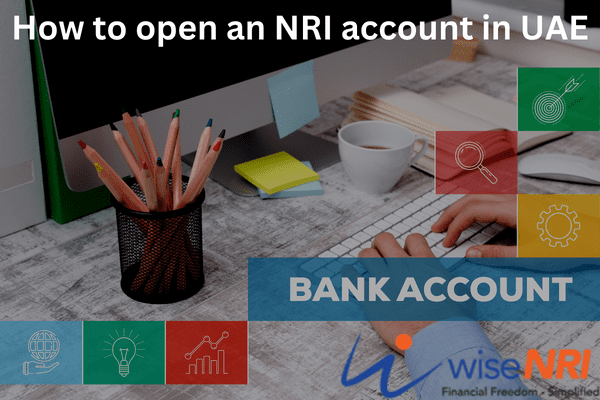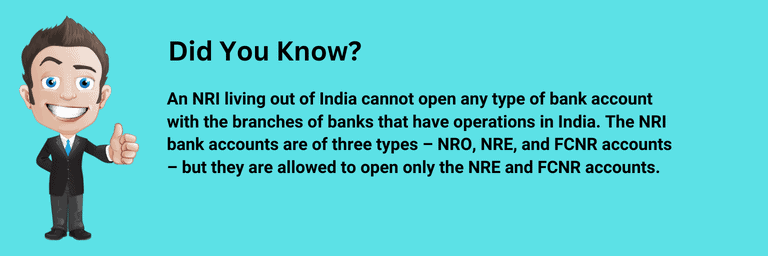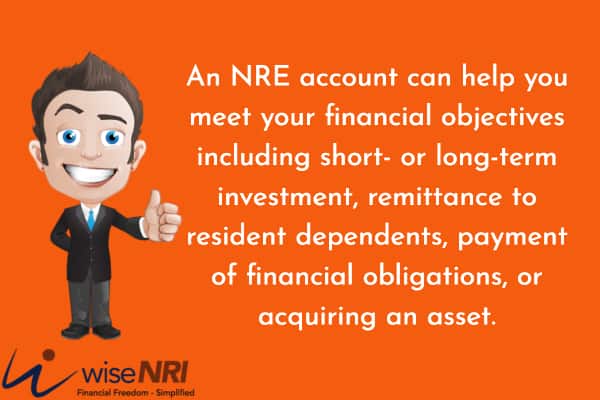As per the estimates shared by the Indian Embassy in UAE, Indians constitute the largest ethnic community in the country with close to 3.5 million Indians in UAE. It is estimated that every third resident in the UAE is of Indian origin.
Many Indians also find UAE to be a preferred place of work in almost every economic domain and sector – be it construction, healthcare, engineering, education, finance, or IT services. This burgeoning Indian populace has strong ties with their families back home. They are in a need of a strong banking partner to cater to their financial requirements – where they can bank easily for sending money, investing, or simply parking it for future use.

Many banks offer services to NRIs (non-resident Indians) in UAE, in their city of residence – including Indian public sector banks (PSBs), Indian private banks, and foreign private banks. In this article, we will closely look at the process of opening an NRI bank account for Indian nationals living in the UAE as well as some of the best banks to do so.
Check – Can NRI open Joint Account with resident Indian
How to open an NRI account in UAE? Types of Account allow for NRI in Dubai
An NRI living out of India cannot open any type of bank account with the branches of banks that have operations in India. The NRI bank accounts are of three types – NRO, NRE, and FCNR accounts – but they are allowed to open only the NRE and FCNR accounts.
Let us look at what are NRO, NRE, and FCNR accounts and which type of accounts can they open living in UAE.
NRO or Non-Resident Ordinary Accounts
Usually, when an Indian resident takes a job offer in a foreign country, goes there for higher education, or starts a business there, their residential status (according to the Income Tax act) changes from that of a Resident Indian (RI) to an NRI. At that time, their bank accounts in India are designated as NRO accounts. These accounts can be held jointly with other resident Indians as well as other NRIs.
These can be a deposit, savings, or current accounts in which any income from Indian sources can be deposited. The income can be transferred from their family members in India, business income, rental income, interest from FDs in India, dividend income from shares held in India, and so on. The interest income from this account is taxable.
The RBI permits outward transfers from the NRO account but with certain limits. The interest income earned on the NRO deposits can be freely transferred, while there is a limit of USD 1 million per annum on transferring the principal from these accounts.
NRE or Non-Resident External Accounts
NRIs can open an NRE account to deposit foreign income earned in the country of residence (or other countries). These accounts are INR-denominated, meaning income from the foreign source must be converted into INR before it can be deposited in an NRE account.
Interest earned on this type of NRI account is exempt from income tax in India but is taxable in the country of residence as per their tax laws. If you want to open a joint account, then it can be opened only with another NRI. NRE accounts can be of any type – savings, current, or deposit – to meet your diverse needs.
FCNR or Foreign Currency Non-Resident Accounts
If you wish to open a term deposit or fixed deposit account and wish to maintain it in any currency other than INR, then FCNR(B) account is for you [The FCNR(A) account scheme was replaced in the FCNR(B) scheme in 1993]. To save on the foreign exchange conversion charges, as well as to maintain the value of your deposits in the target foreign currency, you can open a deposit account with an Indian bank. The following currencies are permitted by the RBI for opening FCNR deposits:
- US Dollars
- Pounds Sterling
- Euro
- Japanese Yen
- Australian Dollars
- Canadian Dollars
The principal in an FCNR account as well as the interest on it are both fully repatriable and the interest is tax-free in India. Many banks offer overdrafts or loans against deposits for FCNR deposit holders at attractive rates and terms. By holding your money in foreign currency, you not only earn better returns than in UAE and other developed countries but also avoid the risk of exchange rate fluctuations.

Must Read- About Mandate Holder In Bank Account
Which Banks Provide NRI Banking Services in UAE?
As mentioned earlier, you can open only NRE and FCNR accounts if you are already an NRI in UAE.
Most large Indian banks like the State Bank of India, HDFC bank, ICICI bank, Kotak Mahindra bank, Yes bank, Bank of Baroda, Punjab National Bank, Axis bank, Federal bank, and DBS provide banking services to NRIs in UAE.
All these banks now offer offline and online modes to open and manage an NRI bank account. With improved and customer-centric regulations and technological advancements, the entire process of opening an NRI bank account is now effortless, convenient, and seamless. In many cases, it will only take 2 days to complete the entire process.
Top Banks and their Offerings for NRIs in UAE
NRE Term Deposit Account *
| Tenure | Below INR 2 Crore | INR 2 Crore and above | ||||||||||||||||||||
| 1 year to less than 2 years |
|
|
||||||||||||||||||||
| 2 years to less than 3 years |
|
|
||||||||||||||||||||
| 3 years to less than 5 years |
|
|
||||||||||||||||||||
| 5 years to 10 years |
|
|
* Interest rates are indicative for comparison purposes only. For the latest and exact rates and tenures, please check the bank website. The ICICI bank website did not mention the rates for deposits above INR 2 Crore.
NRE Savings Bank Account
| Bank | Interest Rate | MAB Requirements * |
| Axis Bank | – For balances less than INR 50 lakh @ 3% p.a.
– For balances between INR 50 lakh and INR 800 crores @ 3.50% – For balances above INR 800 crores, contact the branch |
Fixed at INR 25,000 across all branches |
| HDFC Bank | – For balance INR 50 lakh or above: 3.50%
– For balance below INR 50 lakh: 3% |
– For Metro/Urban branches the Average Monthly Balance (AMB) is INR 10,000
– For Semi-Urban branches, it is INR 5,000 – For rural branches, the AMB is INR 2,500 |
| ICICI Bank | – For balances of INR 50 lakh or above @ 3.50% on end-of-day balance
– For balances of up to INR 50 lakh @ 3.00% on end-of-day balance |
Fixed at INR 10,000 across all branches |
| Kotak Mahindra Bank | Fixed @ 3.50% on end-of-day balance for all balances | Fixed at INR 10,000 across all branches |
| SBI | – 2.70% p.a. for balances less than INR 10 Crore
– 3.00% p.a. for balances equal to or above INR 10 Crore |
– INR 1 lakh for Metro/Urban areas
– INR 50,000 for Semi-Urban/Rural areas |
* MAB – Minimum Average Balance (only for savings accounts)
How to NRI Account Opening in Dubai?
NRIs in the United Arab Emirates have multiple options for opening NRE savings and deposit accounts there. We are not discussing the NRO accounts as they can be opened only in a branch located in India and FCNR accounts would make no sense as AED is not one of the currencies allowed for investments.
Many popular and large Indian banks have their overseas branches in major cities of UAE like Dubai, Abu Dhabi, and Sharjah. These banks include the SBI, PNB, Bank of Baroda, etc. from PSU banks; HDFC Bank, ICIC Bank, Axis Bank, Kotak Mahindra Bank, etc. from the private players (remember it is not a comprehensive list).
You can visit any of their branches near you to open an offline account or use their portals for making an online application. If you are an existing customer, then the process would be much easier for you. The process for offline and online applications across banks is similar as all of them are bound by the RBI guidelines. The difference is apparent in the interest rates they offer and the quality of service.

Must Check –Can NRI Continue With Resident Savings Account In India?
NRI account opening Offline Process
The offline process to open an NRE account is the same as opening any normal deposit or savings account. You can visit the nearest branch of the bank in UAE, fill out the necessary forms and sign them, verify the documents. Once the backend verification is complete in 2-3 business days, you can get the account details and within a week your receipt and/or checkbook.
NRI account opening Online Process
Opening the NRE bank account is now at your fingertips using the secure mobile apps of the bank of your choice. You can also visit the bank’s global (or UAE-specific) website for opening an account with minimum hassle.
The step-by-step procedure guides you through different steps including:
- Filling personal details including name(s) of the account holder(s), address, contact number, citizenship, and country of residence.
- You must have a scanned passport-size photo to upload with the form.
- While adding a joint holder, details of the joint applicant have also to be filled in.
- You must also have the scanned copy of the other documents in the appropriate format, usually JPEG or PDF.
- Once the form is complete, preview it to verify the details and download a copy of it.
- Finally, submit the form and note down the application number for future reference.
- In case of NRE accounts opened overseas, you must visit the nearest branch for physical verification of documents.
- If your bank’s branch is not in a nearby city, then you can send attested documents by regular mail. For attestation, visit the local notary or Indian High Commission.
Once your account is opened, it will be non-operational until funded, so make an initial payment into the account using a wire transfer or issuing a cheque in favor of the bank.
Check – Investment options for NRI in UAE
Documents required for NRI account opening in UAE
The documents required are also the same across different banks, however, some banks may ask for additional documents related to income, employment, or assets. The following is a list of necessary attested documents required for opening an NRE account:
- A copy of the Passport.
- Local address proof.
- Indian address proof (if available).
- Residence permit.
- Employment permit/Professional license for employed personnel.
- Recent passport-size colour photographs.
- Copy of Form 60 or copy of PAN card.
- A cheque is drawn in favour of the bank where you are opening the NRE account.
A Few Suggestions Before You Begin
An NRE account can help you meet your financial objectives including short- or long-term investment, remittance to resident dependents, payment of financial obligations, or acquiring an asset.
For an instant account opening, you can check with foreign banks with branches in India like DBS, or private Indian banks like HDFC and ICICI. Or you may choose to go with a PSU bank with a large branch network like SBI.
Before opening the account choose the right bank and account type by comparing their policies, interest rates, and services offered. In this regard, you can check our Best Bank Account for NRIs. You can also check with your financial advisor who may offer you great advice.
If you have any questions or experience with opening an NRI account in UAE – add them in the comment section.

I have a zerodha account in india and I live outside India. How do I manage it with nri account
Can we open SBI NRO ACCOUNT in UAE
Nri account new open whit documents
Nri account new open in dubai where
I want to open account in Dubai